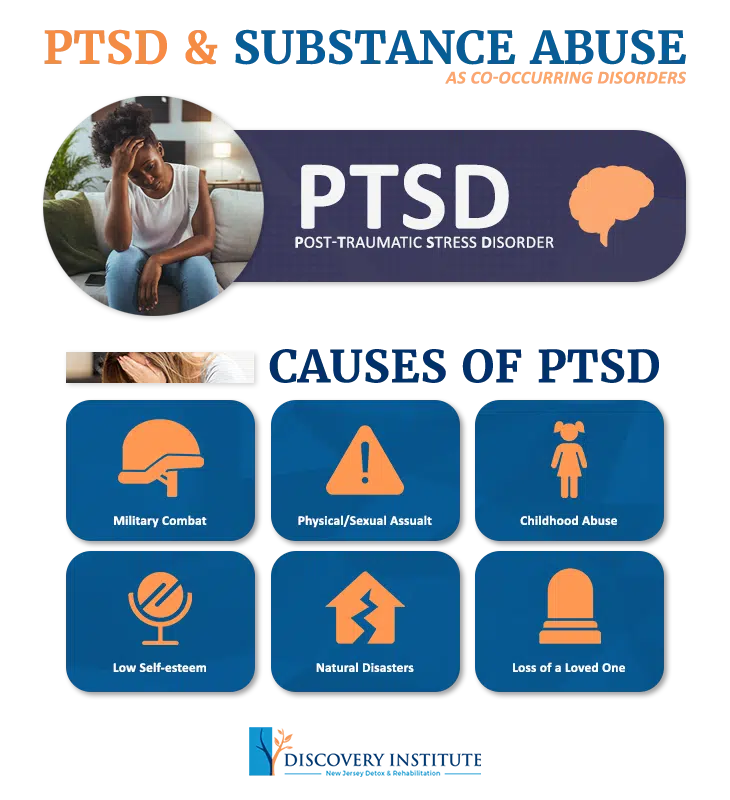PTSD and Substance Abuse Treatment in New Jersey
The Relationship Between Stress and Substance Abuse
Post- Traumatic Stress Disorder (PTSD) is a common psychological disorder often co-occurring with substance abuse. The conditions, often stemming from repeated negative emotions regarding specific events in one’s life include symptoms such as memory triggers, uncontrollable fear, negative thoughts, despair, shame, nightmares, inability to concentrate, etc. Many of those who suffer from this dual diagnosis lack healthy coping skills to overcome their trauma and return the body and mind to a healthy state. Proper Dual Diagnosis treatment tailored to treat both conditions simultaneously can address the underlying root causes of trauma and addiction and allow the individual to overcome both conditions.
How Does PTSD and Substance Abuse Co-Occur?
 The condition is seen in approximately half of the individuals seeking treatment for substance abuse, and studies have shown that each condition increases the chances of developing the other. In other words, individuals with substance abuse disorder are at higher risk of being exposed to traumatic events. Likewise, those exposed to traumatic events are more apt to use substances as a coping mechanism.
The condition is seen in approximately half of the individuals seeking treatment for substance abuse, and studies have shown that each condition increases the chances of developing the other. In other words, individuals with substance abuse disorder are at higher risk of being exposed to traumatic events. Likewise, those exposed to traumatic events are more apt to use substances as a coping mechanism.
Until recently, the two were considered separate conditions and treated as such. Increasing evidence of the conditions co-occurring has led to treatment approaches being tailored to meet the needs of this dual diagnosis. PTSD and substance abuse often go hand in hand. Without proper treatment, the symptoms and side effects of PTSD can become psychologically unbearable. Recovery from this dual diagnosis requires an intense exploration of the root cause of PTSD, as well as an extensive treatment plan for drug and alcohol abuse.
The patterns and behaviors of PTSD are a form of addiction in themselves, often leaving individuals on an endless cycle of repeated negative behaviors, thought patterns, lifestyle habits, and poor coping practices. Substance abuse can become intertwined within these practices, making it difficult to separate the two and understand the triggers for each condition. For this reason, seeking an experienced medical professional to assist in the understanding and recovery of the co-occurring conditions is crucial for the health and wellbeing of any individual living with this dual diagnosis.
Many feel there is a stigma around seeking therapy and other forms of professional help that would label them in negative terms, however, these conditions are detrimental to both mental and physical health and should be addressed under the supervision of professionals, including a trustworthy therapist. Until the root of the problem is addressed, the pain will persist. Our goal is to help you discover the root and put pain at ease.
What Causes PTSD and Substance Abuse?
There are countless live events and experiences that have the potential to cause PTSD and Substance abuse, and some events that would trigger one individual may have no response in another. Exactly what events have the potential to cause these conditions is individualized and based on our own brain chemistry, childhood, and life experiences. For these reasons, only a seasoned therapist or licensed medical professional should be used to accurately uncover the factors causing these conditions in patients. There are however some common themes in those with this dual diagnosis, including:
- Military combat
- Physical and Sexual Assault
- Childhood Abuse
- Low Self Esteem
- Natural Disasters
- Loss of Loved Ones
PTSD often results in nightmares or flashbacks that can occur while asleep or awake and are so intense that the individual cannot decipher these flashbacks from reality. In essence, the individual is left to relive the trauma again and repeatedly suffer physical and emotional pain. Drugs and alcohol temporarily relieve the symptoms of PTSD with their ability to numb emotional and physical senses, but over time the co-occurring conditions intensify one another.
This dual diagnosis is not limited to the symptoms of PTSD and Substance abuse, and individuals who fall under the diagnostic criteria for PTSD and substance abuse experience other serious mental health-related conditions such as:
- Chronic anxiety
- Chronic pain
- Depression
- OCD
- Chronic illness
When the mental and physical body are exposed to trauma from both PTSD and substance abuse, the neural pathways lose their ability to understand when the body is safe and when it is in danger, resulting in chronic stress and unnecessary panic in the body.
Individuals with substance abuse disorder are typically exposed to unsafe conditions including violence, severe anxiety, near-death experiences from overdosing, loss of friends, isolation from loved ones, and more. These experiences are traumatic and trigger the fight or flight response in the brain. As they are associated with the substances themselves, each time an individual uses the substance there is potential to trigger the trauma response in the body.
CONTACT US
Find out how we can help
Our compassionate counselors are standing by to answer any questions you may have. After helping thousands of people over the last 50 years, we have the resources to help you and your family and all your individual needs.
First Responder Addiction and PTSD Treatment
Many rehabs like Discovery Institute in New Jersey cater specifically to this population. It is a recognition that the fearless are in fact human, and their needs are just as important as everyone else’s. A big problem in that community is that first responders are hesitant to ask for help when they need it. They don’t want to be perceived as weak or unable to help. The truth is that asking for help is one of the strongest things a person can do, no matter what their position is in life.
For first responders, specialized treatment is usually necessary. The PTSD of dealing with death and violence is something that not everyone can leave behind after a day of work. For most, we have a bad day at work and return home to our families. The worst that happened was a paper cut. For first responders, they may have faced grave situations in which their own lives were in danger. It simply isn’t the same.
The stress level these people deal with is on a whole new level. And for that reason, individualized treatment and care are necessary. It is often spoken about how trauma treatment is a vital part of addiction treatment. For first responders, learning how to deal with trauma might be the primary tool in getting rid of addiction.
Just because they are “the strong and the brave” doesn’t mean that first responder PTSD isn’t an issue. We encourage people like firemen and police officers to accept help so that they can set a standard for others around them. When more people become open to accepting help for drug and alcohol addiction, the number of people saving their own lives through treatment will rise.
Treatment for PTSD and Substance Abuse
 According to Clinical Psychology Journal, about 50-66% of those who suffer from PTSD also battle co-occurring addiction. The National Institute on Mental Health also reported that PTSD will affect about 7-8 out of every 100 people in their lifetime.
According to Clinical Psychology Journal, about 50-66% of those who suffer from PTSD also battle co-occurring addiction. The National Institute on Mental Health also reported that PTSD will affect about 7-8 out of every 100 people in their lifetime.
The stress effect of both PTSD and addiction causes the levels of GABA (gamma-aminobutyric acid) to lower, and cortisol and adrenaline to heighten. GABA essentially acts as a natural tranquilizer for the body’s mental and physical senses, and drugs often mimic the effect of this amino acid. Thus, we can see how addiction becomes occurs alongside PTSD- it temporarily counteracts the negative effects of PTSD on the body’s chemistry.
The dual diagnosis complicates treatment approaches as one cannot be cured without the other being addressed. With increased drug use, the body will have a much more difficult time naturally regulating the proper amounts of chemicals, making the effects of PTSD more intense and unbearable. Here we see why a specific and tailored treatment program is essential to successful rehabilitation.
The first treatment that will be utilized is talk therapy, likely in the modes of CBT (cognitive behavioral therapy), CPT (Cognitive Processing Therapy), and ACT (acceptance and commitment therapy). These modes of talk therapy will help the provider and the patient understand what life events, exposures, and experiences triggered the PTSD response in the body. Once the underlying root causes are understood, the patient will be able to work towards responding to the event in healthy ways, understanding the connection between the dual diagnosis, and addressing the co-occurring conditions simultaneously.
If substance addiction is severe, detox is likely the first step in the treatment plan. Since detox will alter the brain’s chemistry and once again drop the functional levels of positive brain chemicals- patients should expect to stay in a facility for the first stages of treatment to ensure the supervision of medical professionals.
As the brain’s chemicals start to even out, the effects of talk therapy alongside other holistic approaches will show noticeable changes in the patient’s demeanor and overall ability to cope. Oftentimes, treatment programs will include therapeutic activities like:
- Acupuncture
- Art Therapy
- Yoga
- Music Therapy
- Breath Work
The main goal of treatment is to come back to your true self and heal the trauma of your past so you can start fresh and with a clear, healthy mind.
Once the addiction side of the dual diagnosis is under control, the stress of PTSD is given long-term attention and tools for healthy coping. Even once an individual is back to his or her normal self, it is inevitable that they or will face triggers once again. Successful treatment will give them the tools to allow those triggers to occur but not leave a lasting effect.
Treatment should be a combination of methods to address both the emotional PTSD symptoms and the addiction itself. Typically, addressing PTSD with help the addiction. Treating the addiction will also help with PTSD, as a clearer mind will be able to process emotions more functionally.
Treatment at Discovery Institute
Here at the Discovery Institute, we provide comprehensive services designed to address all aspects of the disease of addiction and mental health, from initial assessment and detox to therapies and support groups, and thorough aftercare. Clients are offered multiple evidence-based approaches, each having been shown clinically to fight addiction and PTSD from various angles. Upon discharge, clients will have the tools and confidence they need to maintain sobriety and regain control of their lives. Contact us anytime to start your journey!
Dr. Joseph Ranieri D.O. earned his BS in Pharmacy at Temple University School of Pharmacy in 1981 and His Doctorate Degree in Osteopathic Medicine at the Philadelphia College of Osteopathic Medicine in 1991. He is Board Certified by the American Board of Family Medicine and a Diplomate of the American Board of Preventive Medicine Addiction Certification. Dr. Ranieri has lectured extensively to physicians, nurses, counselors and laypeople about the Disease of Addiction throughout New Jersey and Pennsylvania since 2012.



